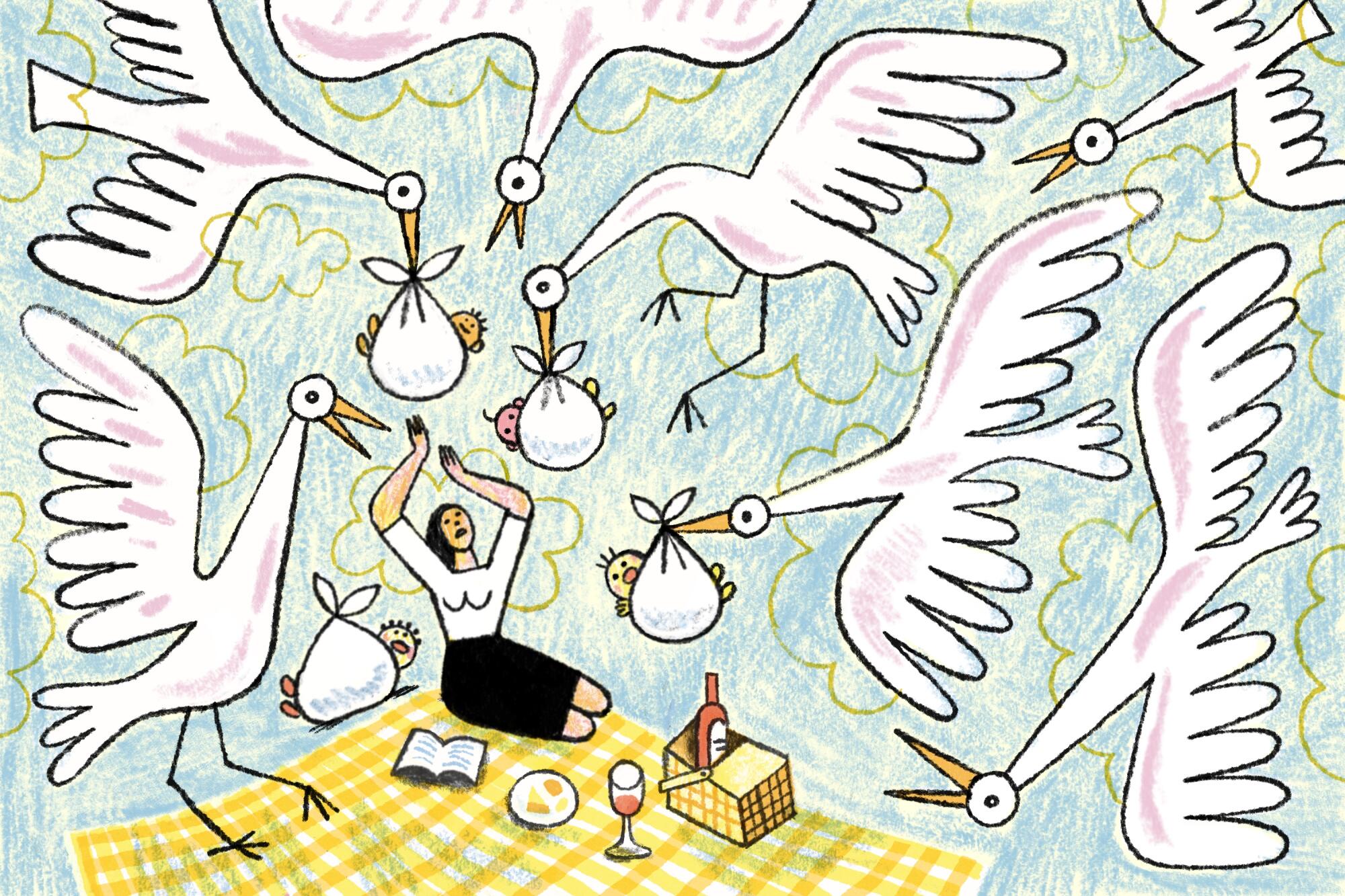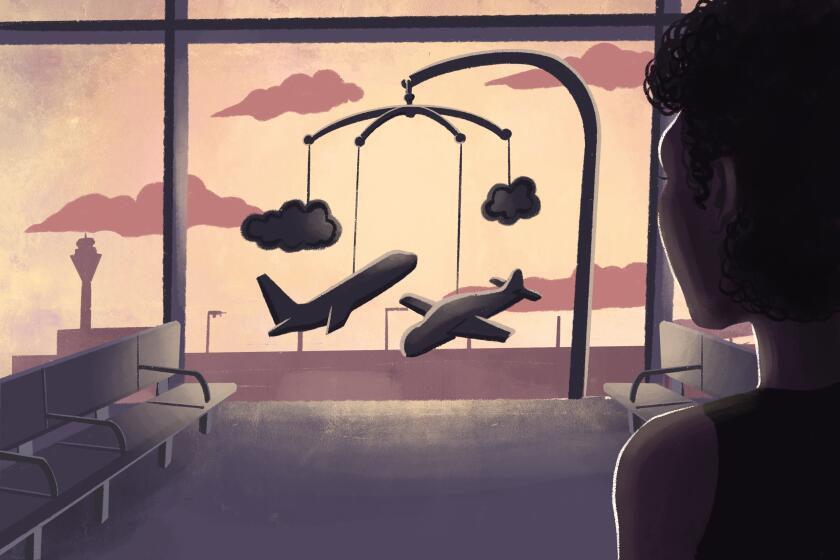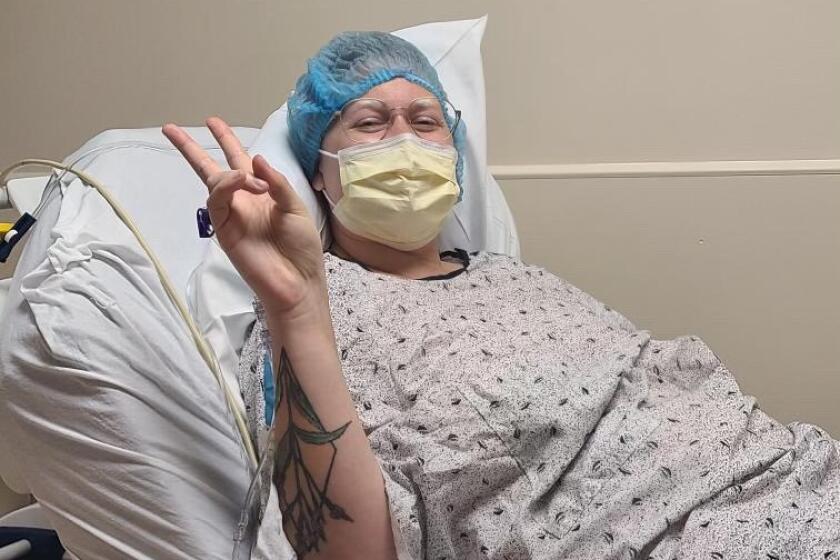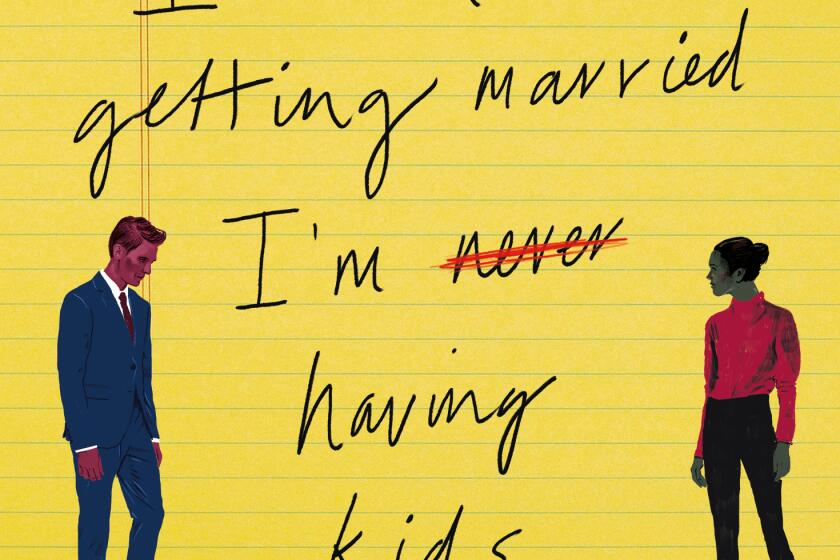
- Share via
I love children. I mean, I’m not volunteering to change a diaper, but I’ll happily roll down a hill. When I’m with my nieces, I marvel at their sense of play, their freedom. I remember what life was like before the world told me my dreams and thighs took up too much space. Like I said, I love children.
But I don’t plan on having any of my own.
It took me a long time to be able to say that out loud. And by “out loud” I mean whispering it with a hint of uncertainty so as not to offend. Because when you’re a married woman of a certain age with no kids, people have questions. Fertility advice. Pity. Judgment. Lots of judgment.
At gatherings I respond to the anticipated, “When are you having kids?” with a teasing, “Ohhh we’ll see hahahahaa,” and hurry over to the snacks. Because if I’m honest about not wanting kids, I’m never getting to the snacks. I’m getting cross-examined. “You’ll regret it.” “But you were just rolling down the hill! You liked it.”
And someone will promise I’ll feel different once I have my own. But what if I don’t? You can’t just drop your baby off at a fire station like in the good old days. (You never know who’s filming and you don’t want to get canceled.)
By not having children, I gave myself the space to consider what I prefer to do as opposed to the “shoulds” set before me by the church, gender roles and society.
Even though 44% of adults surveyed in 2021 said they are unlikely to have children, society pushes baby-making, still viewing motherhood as a woman’s primary role. Some people even feel moral outrage toward those who choose to be child free, according to a 2017 study. The pope called us selfish and Elon Musk went as far as suggesting we lose our right to vote. The Supreme Court eliminated the federal right to abortion while some states are limiting access to certain forms of birth control, all but forcing some women to have children.
The pressure to procreate comes from so many directions I’m considering pitching a “Walking Dead” spinoff where the child free are the living and everyone else are zombies trying to turn us. But it’s a comedy so no one dies, except on the inside.
As someone raised by an Afghan Muslim father and a white Christian mother, I can tell you firsthand the desire for grandchildren transcends culture and religion. By not giving them, I am the honorary brown sheep of the family. When my husband and I reached three years of marriage and had nothing to show for it but happiness, his parents even staged an intervention.
My mom-friends often confide in me the inequities of motherhood — how the childcare duties fall mostly on them and their bodies have shifted to the side and down. They lament the loss of time for personal, career or creative pursuits of their own. So, when I told one friend in an uncertain whisper that I wasn’t planning to have children, I was shocked by her reaction: “Telling people you don’t want kids is like telling people you’re vegan. It’s not about your healthy choices. It’s about making other people feel bad about their choices.” And then she prayed I’d change my mind because having kids is the best.
I promise she’s not a monster. She’s a zombie, and that’s just what zombies do.
Women across the country are seeking out sterilization after the U.S. Supreme Court overturned Roe vs. Wade, which had guaranteed abortion access.
When I was done being hurt, I realized her comment wasn’t about me at all. It was her brain short-circuiting on the idea that any of it was a choice. We’re taught that having children is just what women do. The first toy I remember getting was a doll that could eat, cry and pee — and it was my fun to take care of it. The next year I asked for a riding lawn mower and got an Easy Bake oven. Little girls are indoctrinated into wanting children and made to believe their value lies in their ability to care for others. As long as it’s something everybody just does, no one needs to question it.
But I wasn’t judging my friend’s choice to have kids. I was seeking validation for my choice not to. Because the truth is, I wanted to want children. To be “normal.” I fought myself for years, wondering if there was something wrong with me. I kept waiting to feel my biological clock, praying the baby fever would arrive before the hot flashes. I made pro and con lists, even paid $4.99 to text a psychic. The FOMO was real, but it went both ways: I feared missing out on a huge life experience if I weren’t a parent and I feared not fully experiencing life if I were a parent. At least the kind of life I wanted to live.
Of course, there are people who genuinely want kids and love parenthood and just want for me the thing that brings them so much joy. I envy their freedom in knowing. I smell their babies’ heads and hug their toddlers and I’m transported back through my “Sliding Doors.”
You see, it’s not that I didn’t want kids. I just wanted other things more.
Like freedom. And martinis.
Because, despite societal pressure, you can’t actually have it all. But you can decide what having most of it looks like to you.
I told my dates upfront: I’m in it for the fun, not the long-term.
It wasn’t a decision I took lightly. I think people who choose not to have children think about having children a lot more than those who have them. Because every decision has an opportunity cost — the value of the options you forgo.
By forgoing motherhood there’s a whole kind of love I’ll never experience. I’ll never get a second chance to see the world for the first time through the eyes of a child. I’ll never know the little soul my husband and I could have created.
By choosing otherhood I was able to travel to Portugal and live in South Africa this year. I pursued a new career. I flew across the country to surprise my niece at her dance recital and took my parents to see “The Kite Runner” on Broadway. I prioritized sleep. I had spontaneous date nights with my husband and baked for my girlfriends.
Life is about choices. Having them (or not). Owning them. And sometimes regretting them — but I would argue even that’s a choice. Because often there’s really no right or wrong decision, there’s just the one you make and you do your best to be happy.
Neither the choice to have children, nor the choice not to is better, in and of itself. One was just better for me.
Ursula Taherian is a television writer and actor. She recently wrote on the CBS comedy, “The United States of Al.”
More to Read
A cure for the common opinion
Get thought-provoking perspectives with our weekly newsletter.
You may occasionally receive promotional content from the Los Angeles Times.













